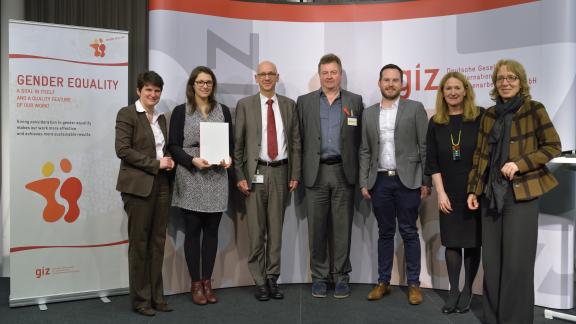IPPF has been recognized in the GIZ Gender Prize 2016 competition which promotes gender mainstreaming.
Deutsche Gesellschaft für Internationale Zusammenarbeit (GIZ), a leading provider of international cooperation services for sustainable development, holds an annual internal Gender Competition to promote creativity and innovation for gender equality in their sustainable development work.
GIZ’s global BACKUP Health programme won first prize for promoting gender equality within programmes funded by the Global Fund to fight AIDS, Tuberculosis and Malaria.
The collaborative ‘Shadows and Light’ project with IPPF was highlighted for its gender transformative approach to sexual and reproductive health (SRH) and HIV services for all, including women and girls, men and boys, and anyone perceived to be outside of the norms that constitute what are ‘feminine’ and ‘masculine’, including lesbian, gay, bisexual, transgender and intersex people.
Delivered by IPPF Member Associations in Cameroon, Kenya, India and Uganda, the three-year project focused on men who have sex with men, sex workers, people who inject drugs, and transgender people – populations at increased risk of HIV and other STIs – and set out to improve the linked sexual and reproductive health and HIV needs of these key populations.
Alan Smith, IPPF’s Senior Advisor, HIV said: “I am very pleased that IPPF is recognised - with our partners GIZ - for this gender award linked to International Women’s Day, in particular for our innovative Shadows and Light project which focusses on the rights of key populations and challenges traditional gender norms.”
Other winners included a renewable energies and energy efficiency programme in Mexico and a vocational training and sustainable development initiative in Ghana. Eighty seven teams from 52 countries participated in the competition which covered the fields of governance, economic development and employment, environment, climate change and biodiversity, agriculture and rural development, energy, public finance, education and health.
when
Subject
HIV and STIs, Gender equality








